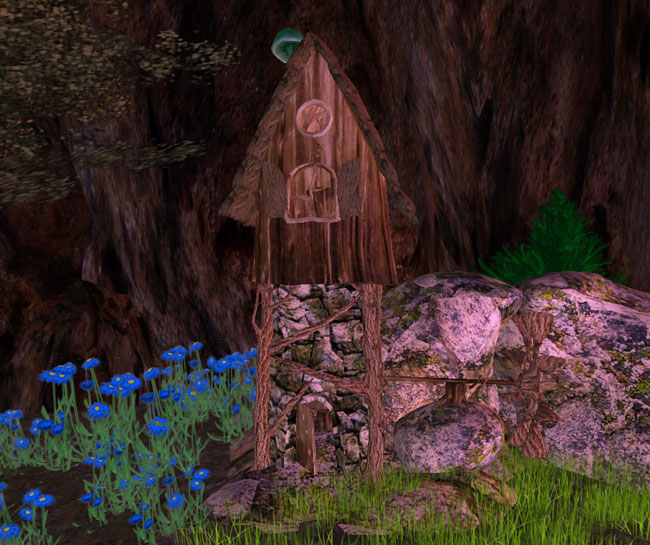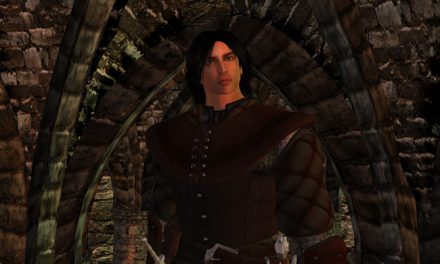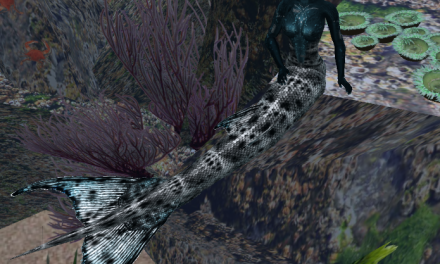 The Beginnings of a Witch
The Beginnings of a Witch
By
Dana Himrich
Once upon a time, a girl walked into a dark forest and never came back out again.
Sara hadn’t wanted to go near the woods. All sorts of terrible things were in there waiting to gobble up little children like her, or so her nanny said. But her nanny was up in the nursery sleeping off a bottle of brandy, and the more Sara weighed the options before her, the more she realized she had no other choice. Only one person could solve her predicament.
She slipped out the front door of the large chalet where she lived, carrying with her a parcel wrapped in a blanket. The few servants who would normally be about had been dismissed for the day on account of her mother’s trip to the doctor in the next town over. Sara was grateful for her luck as she began the long walk down the hill overlooking the valley. The neatly kept cobblestone path leading to the chalet crossed the worn dirt one that wound off through the center of the village. It was this path which Sara took.
Clutching her package close to her chest, Sara kept her eyes looking towards the ground and walked as quickly as she could. She could feel the villagers giving her odd looks as she hurried by, sticking out like one of her family’s pet peacocks with her pink silk frock and golden ringlets. Still, no one said a word. She supposed it to be an advantage of her new position. Noblemen’s daughters could do as they wished.
Sara slowed her pace as she left the village behind and came to the point where the woods began sprouting up. The dirt path soon vanished altogether underneath the grass and rocks. Tall pine trees towered over her, crowding close together and blocking out the afternoon sun. She would have gotten lost at once were it not for the small, curving arrows scratched into the tree bark, pointing the way towards her destination. It would do the inhabitant of these woods no good to leave all her potential customers stumbling about in the dark.
All of a sudden the trees gave way, as though they were too frightened to extend their reach any further. The wind and all of the little animals had fallen silent as well. Sara had come upon a small clearing, carved from the forest and barren of flowers, grass and tree stumps. The surrounding greenery had not grown back in; instead it stood at the clearing’s edge and grew like fortress walls.
In the center of the clearing, there was a cottage. It was not like the cottages in the village, which were made of stout timber and stones and had fine shingles for their roofs. This cottage was smaller than those others, and much more lopsided. Pieces of the wall were made of rough stone blocks, worn down over time. Others were made of jagged logs and planks. The roof was iron, patched in some places with thatch. The windows were mere holes in the walls, too dark to see through. The only door swung on rusty hinges. Sticking out from the side of the hovel, like an extra limb, a chimney belched black smoke from its gullet.
Surely this must be the witch’s house, Sara thought. Only a witch would want to live out here, and in so strange a place. But wouldn’t a witch use her magic to fashion herself a grand palace, simply because she could? Or perhaps an enticing little house to charm the unsuspecting visitors she used for her stews…
She knew she should not have come here, but the weight in her arms reminded her why she had to.
Treading lightly across the ground, Sara approached the door of the cottage. She whispered a prayer under her breath, and then knocked three times on the ancient wood.
“Who is it?” a voice called out from within – loud and harsh, like two stones rubbing together. “I said who is it?” it called out again when the girl did not answer. “What are you doing here?”
“Are you the one the villagers call the Clockwork Witch?” Sara asked.
“That doesn’t answer my question, girl.”
“I have something I would like you to fix,” said Sara. “I can pay you whatever you ask for. My stepfather is the Duke.”
At this the cottage door was flung wide open, nearly knocking Sara off her feet. In the doorway stood the oldest woman she had ever seen.
The witch was small and hunched over, her back arched. Her skin was brown, weathered and wrinkled. A dirty bonnet covered up her white hair, which poked out in curly strands from underneath. Her dress was sewn from rags and patches of muted colors, but the leather belt around her waist was brand new and carried a number of strange little iron tools. On her right hand was a leather glove with the fingers cut off; her left hand was gone altogether, arm included. In its place was a polished bronze limb that whirred and hissed out white steam as it moved. The hinged, metallic fingers drummed on the wood of the doorway as the witch leaned against it.
The witch took a pair of bifocals from her belt and peered down at Sara. Her olive eyes narrowed at the sight before her. “What business does the Duke’s child have in these woods?”
“I’m not the Duke’s child.”
“That fine dress says otherwise.”
Sara held up her poorly wrapped parcel. “His favorite clock is broken. I’ve come to ask if you can repair it.”
“Then why didn’t you just say so?” the witch said, perking up. “Come in, come in!”
She disappeared into the darkness of the cottage. After a moment’s hesitation, Sara followed her inside.
As soon as she stepped over the threshold, Sara flinched and tried to shield her eyes from the sudden light. The inside of the hovel was brighter than its outside had led her to believe – much brighter. Sunlight streamed down through gaps in the roof, and jars holding lit candles rested on shelves and hung from the rafters. She craned her neck upwards and nearly dropped the clock when she saw just how high the ceiling rose. Why, the whole chalet would comfortably fit just in this room! The witch had made herself a grand palace after all.
Yet there were few empty spaces in the strange cottage despite its size. All of the walls were covered in shelves full to bursting with mechanical trinkets of many sorts. There were simple timepieces on chains, cuckoo clocks that held dancing figures and singing birds behind their doors. Beside them stood tall mahogany grandfathers adorned in gold. There were other devices as well, telescopes and microscopes and spinning bronze globes that Sara couldn’t fathom a use for. On the floor, colorful wind-up toys sped and skittered around her feet. Wood shavings and discarded gears covered the worn boards like a blanket of dust.
Sara felt herself smile as the sounds of ticking clocks, whirring gears and singing chimes melted together in her ears. The sound of one clock had always felt so lonely to her. The sound of many was a symphony.
“Now,” said the witch, who had donned a ragged old apron, “come over here.” She was brushing debris off of a wide work table sitting in the center of the room. “A clock, you said?”
“Yes, ma’am.” Sara sat down her parcel and unwrapped it.
She had done a poor job of trying to hide the damage. The wooden miniature chalet making up the shell had been crushed nearly beyond recognition. The cream-colored face that went in its center had been put back lopsided. At least an inch of the minute hand had been snapped off, and the numbers 5 and 7 were missing as well.
The witch seemed unfazed, even as she lifted off the façade and poked at the loose, disconnected gears. She struck one of the chimes with a bronze finger and winced at the harsh, sour noise. “Poor thing! Let’s have a closer look at you.” She clipped a magnifying lens from her belt to one side of her spectacles and pulled a pair of little metal tweezers out from underneath her bonnet. Clearing away the splintered wood, she began to rummage around inside the clock. “Hmm…I see…”
“Will you be able to fix it?” Sara asked.
“If you believed I could not, you would not have come.” The witch stepped away from the table and opened up a drawer in one of her many cabinets. “You did an admirable job of trying to repair it, by the way. Rare for someone of your station.”
“How do you know about that?”
The witch ignored her and returned to her work. “Now don’t get it into your head that ‘good’ means ‘admirable’ in this instance.” She pulled a handful of screws and gears from the drawer, piled them on the table and began making another pile with the broken odds and ends she was now pulling from the clock. “The front piece can’t be saved. I’ll have to make a new one. Oh, don’t look so frightened, child,” she added, seeing Sara’s face turn pale. “It will take no time at all. I only need to finish this part.” Now she was replacing the broken clock pieces with the ones she had procured. “You have a fine throwing arm, I must say.”
Sara looked down at her shoes. “I-I don’t understand what you mean, ma’am…”
“There’s no reason to deny it now. You’ve already turned a good piece of woodwork into splinters.”
Sara could feel the blood rushing back into her face. “It was an accident,” she said, raising her voice a bit. “I didn’t mean to do it.”
“Of course you did,” said the witch without bothering to look up from her work. “I won’t tell, dear. I’ve always said there’s nothing wrong with a little rebellion every now and again.”
“You don’t know anything about what happened,” Sara said, forgetting for a moment where she was.
The witch smirked. “I know you were playing with a cricket ball indoors when your parents had told you not to.”
“Because the duke never lets me play outdoors at all!”
“Ah, but he went with your mother on her doctor’s visit and won’t be back until evening.”
“But the servants…”
“Your nanny can’t see past the mouth of a wine bottle, and the rest of them are gone for the day. Besides, they wouldn’t tell the duke if they saw you setting foot outside. They don’t care how you high-born folk spend your time. I would know.”
“Don’t call me high-born,” Sara said under her breath. “And you still can’t prove I meant to break the clock.”
“Still trying to test us, are we?” The witch turned and stared down at her through spectacles pushed to the tip of her nose. “This was a fine piece. Hand-selected wood for the exterior, I’d guess. Well varnished. Imported paints. Not a gear out of place inside. This would have gone right on the parlor mantle, I’m sure. Right where some girl could see it and think of how her new father loves his fine things more than her and her mother, and how she would love to take her pretty prison and smash it to dust.”
“And what’s so wrong about that?” Sara shouted, leaping to her feet.
The witch raised her eyebrows. “No one’s ever spoken to me like that before, girl.”
Sara tried to turn around and run for the door; her trembling legs made her trip, and she fell to the ground. She froze as she watched the witch get up from her stool and loom over her. Perhaps she means to lay a curse on me for disrespecting her so, she thought.
“I’ll do no such thing,” said the witch. She held out her right hand. Sara took it and was helped to her feet.
“I’m sorry, ma’am,” Sara said. “I shall not raise my voice with you again.”
“Pah! You’ve nothing to apologize for, my dear. I was hoping you would do just such a thing. Questioning of authority is such a rare trait in these times, you know. I thought the duke might have beaten it out of you.”
“I don’t understand what you mean by all this…”
“No, I suppose not,” said the witch. “Would some tea and biscuits help clear your mind better?”
They went down a set of stairs into a cozy little basement. A pot of tea whistled on a stove, and a little table was set for two with a basket of cakes and biscuits in the center. The witch let her take what she wanted, having only a single cup and a few morsels for herself. It was all so warm and fresh and rich; for a moment it crossed Sara’s mind that it might be fairy food, but it was too fine a meal for her to care.
“I didn’t think my cooking was that good,” said the witch, raising an eyebrow. “What on earth do they feed you up at that house, girl?”
“I always eat with the servants after Mother and the Duke are finished,” Sara said, wolfing down the last of the biscuits. “And I never get called down to tea.”
“Some way for a father to treat his daughter!”
Sara shook her head. “My father was a tailor from the city.”
The witch leaned forward in her chair. “And how does a tailor’s widow become the wife of a duke, might I ask?”
Sara shrugged. “He wanted a pretty wife, I suppose. And Mother was too ill to go out and find work.”
“How is your mother now?”
“Getting worse…” Sara’s voice trailed off. “You were right about the ball and the clock,” she said at last. “I shouldn’t have denied it.”
“I remember how it felt, hearing what I didn’t want to admit,” said the witch. “The woman who lived here before told me much the same thing.”
Sara looked up. “The woman who lived here before?”
“I’m hardly the first witch to have haunted these woods, child.”
“How did you get to be a witch?” Sara asked. “Were you from the village?”
“I came from a fine old house like yours.” The witch smiled and then frowned. “It isn’t standing any longer – good riddance.”
“You weren’t happy there?”
“I was told I should be grateful, because I had everything a young lady could wish for. Everything except what I needed most.”
Sara found herself nodding in agreement.
“I would come to these woods to escape every now and then,” the witch continued. “And one afternoon I met an old woman sweeping dust from the step of a little cottage. I was home.”
“I thought witches liked to eat children,” Sara said.
The witch laughed. “Ah, no! The meat is far too tough!” She shook her head. “Only another story people tell to frighten each other. Most of us are rather fond of children, however. Tend to keep at least a few.”
“Why is that?”
“Because we need someone to pass our knowledge on to. Make sure it isn’t forgotten when we die.”
“And that was how you became a witch.”
“It’s how all witches become witches.”
Sara smiled. “I like the sound of it.”
“It wouldn’t be an easy life, if that’s what you’re thinking.”
“No, I suppose it wouldn’t be.” But still, there was something to be said for how the little cottage felt so much like the family garret back in the city.
When Sara and the witch returned to the main room, several of the clocks began to chime at once. The witch nodded and wiped her hands on her apron. “It’s time you were on your way, girl.”
“On my way? But the clock isn’t fixed yet.”
The witch stepped aside. There on the table sat the clock, looking just as it had that morning. Every chime was tuned, and every painted piece was back in its right place. “And the wood ought to be more resistant to cricket balls as well.”
Sara found herself marveling at her own reaction, for she could not find a hint of shock or fear within.
The witch wrapped the clock back up in cloth for her. “Now, if you leave this instant I think you’ll be able to slip this back on the mantle before your nanny wakes up.”
“What shall I pay you for this?”
“The conversation was enough. I get it so seldom, you know? And if you feel you owe more, you may come back for tea some afternoon.”
Sara lit up. “I can come back? You mean it?”
“Only to visit for now, not to stay. Not yet.”
“Why couldn’t I?”
“It isn’t quite your time, I believe,” said the witch. “There are some matters back at that house which still require your attention.”
Sara thought of her mother. “How will I know when it is time?”
“I suspect you’ll know the answer to that before anyone else,” said the witch. “Clever young ladies often do.”
With a wink and a wave of her hand, the witch opened the cottage door and swept Sara out into the sunlight.
Sara shielded her eyes from the sudden glow and stumbled across the threshold – not back into the forest, but into the quiet of the downstairs parlor.
A carriage was pulling up to the front of the chalet. Sara replaced the clock and hurried from the parlor just as the front door opened.
Her mother called her down to give her a greeting. She looked as warm as ever, but also more pale and fragile – she could not stay standing up for very long. The duke took little notice.
That evening, they all had dinner together for once. The duke spoke in loud, brash tones of what a fool the doctor was, how there was nothing wrong with his wife and no need for Sara to worry. Sara’s mother would not look at him.
“I’ve been thinking about reducing the staff, darling,” the duke said not long afterwards, in the same tone he had used to discuss his wife’s condition. “There are better uses for the household funds.”
“Sara could use a tutor,” her mother said. Her voice was little more than a whisper. “Or perhaps there’s a school we could board her at. You’d like that, wouldn’t you, dear? Girls your own age, a good education?”
The duke rolled his eyes and let out a huff. “If you insist…”
“What sort of life would you have for her, then?”
“I’ll see to it,” he answered, dismissing her with a hand wave. “After I see to reducing the staff. I think we could get along fine with only one or two.” He glanced at Sara out of the corner of his eye.
Sara’s mother grew frailer as the weeks wore on. She left her bedroom less and less, and then not at all. The doctor came and went, his face always looking grave. The servants whispered to each other and bought black crepe. The duke made them throw it out.
It was snowing on the night she died. Sara had been hiding at the end of the long hallway that led to her room, watching the candlelight flicker for hours. Finally she could stand it no longer, and she crept to the door.
Her mother was alone. Shrouded in the dark, she mumbled to herself, trying in vain to wipe the glistening sweat from her brow. The sickness had sapped the strength from her bones.
Sara went to fetch a wet rag from the water basin, but her mother grabbed her by the arm.
“Sit with me,” she said. She reached out and brushed a tear from Sara’s cheek. “I don’t want us to remember each other like this.”
“No, Mother.”
“I thought…that this would be a better life for you…” Her words were lost in a bout of coughing.
“Let me go get someone.”
“No,” she said, louder than before. “No, you must…you must look after yourself, Sara. Promise me you will look after yourself.”
“I will,” said Sara, but she was unable to hide the quiver in her voice.
Her mother seemed satisfied at this, and she leaned back on her pillows. “Don’t be afraid. You’ll fare well. You’re a clever young lady…”
She said nothing else after that. Sara leaned over her and kissed her forehead. More minutes passed. The candle near the bedside, melted down to nothing, flickered out. Her mother’s shallow breaths stopped altogether.
The silence and the darkness set in. Sara got up, covered her mother’s face, and looked around the barren room. She understood what the witch had meant by knowing when it was time.
She was gone before anyone could notice. Dressed in traveling clothes with a satchel of belongings on her shoulder, she slipped through a back door and out into the snow.
The sun was rising when she found the cottage again. The witch was shoveling snow off her front step. She didn’t look up when she heard Sara approach, but only greeted her with a simple “Back again?”
“It was time,” Sara said.
The witch looked up. “Are you certain?”
Sara nodded. “My mother died last night.”
The witch said nothing for a moment. Then she set down her shovel and held out a hand. “You had better come inside, then.”





This story is a clever twist on the usual expectations of what a witch is in popular culture, and more like someone accused of being a witch would have been in the past, the wise woman of a village. Nicely done.